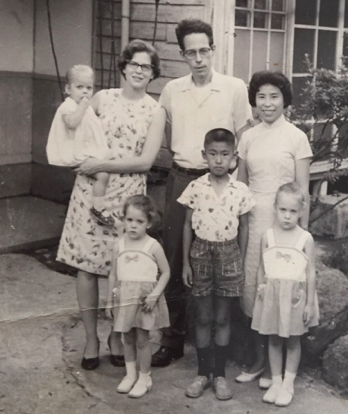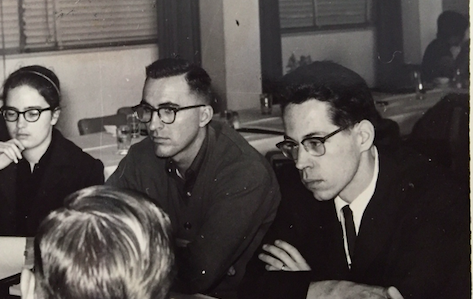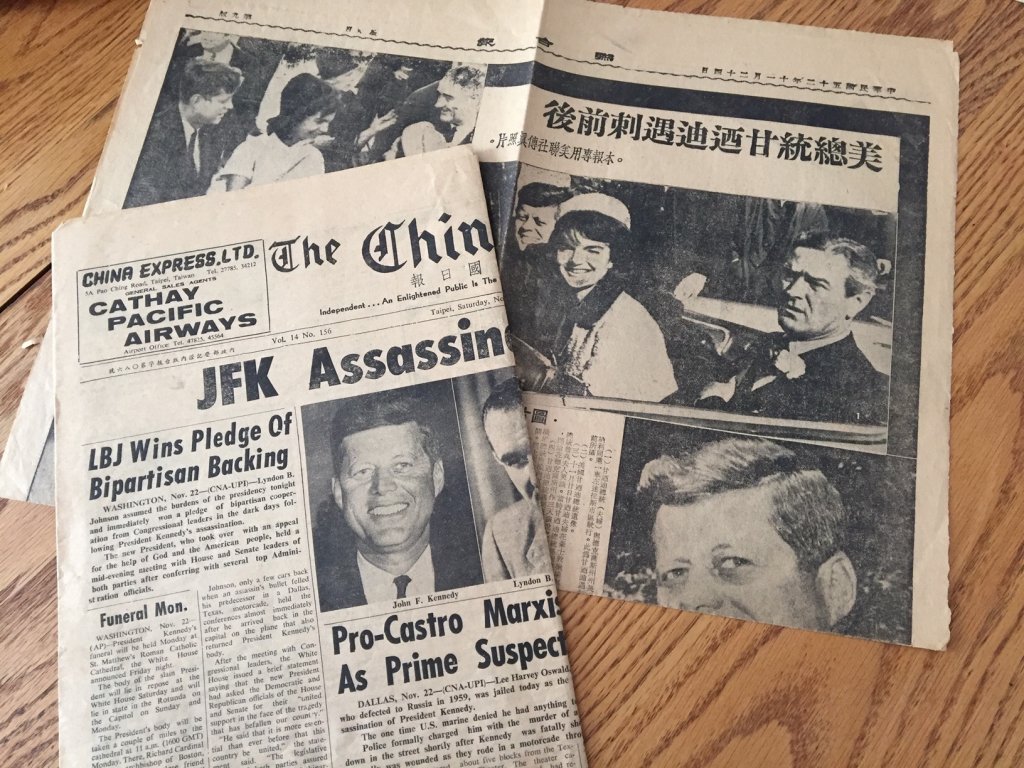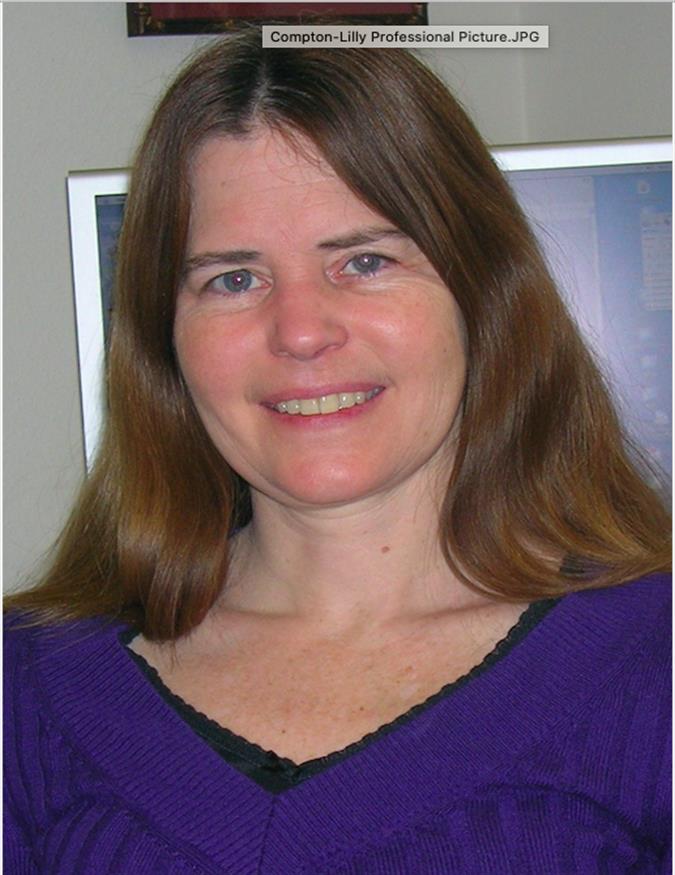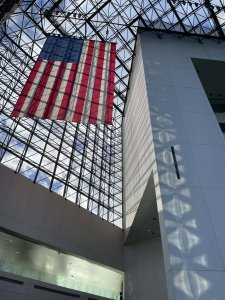From September 1963 until August 1964, my father was part of a team of scholars from Stanford University who came to Taiwan to help establish the National Taiwan University International Chinese Language Program (ICLP). My two sisters, my mother (Barbara) and I joined him that year in Taipei. My oldest sister (Margaret), was 4 years old, I was three years old, and my youngest sister (Susie) was only one. I have a few memories of that year and a stack of letters that my father wrote to my grandmother. While my father was primarily funded by Stanford University during his time in Taiwan, he applied for and received a travel grant from the Taiwan Fulbright Foundation.
As I complete my six-month appointment as a Fulbright scholar at National Tsing Hua University, I take this journaling opportunity to weave together a few of my thoughts and with quotes from letters written in 1963 and 1964.
Traveling from San Francisco to Taipei with three young children was difficult. As my father reported:
We got to Taipei in really bad shape; the kids fell asleep (all three of them) about 10 minutes before the CAT [China Air] flight landed. The change of weather was something; hot and sticky–the kids were miserable. We practically crawled off the plane with all our junk. Half the city of Taipei was there to meet the plane including the army, navy and air force–but not for us. It seems Chiang Ching-kuo, son of Chiang Kai-shek was on the same plane returning from the U.S. We were met by Dr. Chin from the [Language] center and taken to a hotel
As we commenced our Taiwan visit, we were provided with a house that is located very close to what is now Da’an Park. My father wrote:
We have rented a Japanese style house not too far from the university and we have an Amah to help Barbara with the housework. The address is–Yung Kaµg Chieh, Lane 2J, #21; Taipei, Taiwan
I remember that house and its small Japanese-style garden. I recall the step in the entryway where people removed their shoes and the mosquito nets that we slept under. As my mother consistently reported, having an Amah to help with the shopping and the groceries was not only affordable in Taiwan but also absolutely necessary. When we arrived, my mother spoke no Chinese and there were open-air markets rather than shops for grocery shopping, In addition, shopping required substantial bartering skills.
As my father explained:
Our house is quite nice. It’s Japanese style. That means sliding doors, screened with paper etc. The kitchen is not in the house proper, but is outside in a sort of concrete storeroom-like affair. All drains are open and that means all bath water, dish water, etc. drains through open ditches into a larger ditch which runs outside the front gate. The house is surrounded. by a high wall with a high gate in front. The front wall is continuous all the way around the block and is studded with pieces of broken glass embedded in concrete to keep out prowlers, which are apparently quite common. On the advice of the center we have gotten some burglary insurance. Someone must be in the house at all times.
In terms of safety and crime, Taiwan has changed a lot. When I get back to the United States, I will miss being able to walk at night and not having to worry as much about my safety. Of all things that I remember very clearly about my childhood year in Taiwan, I remember the open gutter outside the wall that surrounded the house. Interestingly, I have returned to this address in Taipei a couple times. There is an apartment building where the house used to be, but the tall wall still stands. The open gutter has been covered but it also remains.
Even today, I find prices in Taiwan – especially food and travel – to be very reasonable. In 1963, they were amazing. My father commented on finances in Taiwan.
Our Amah is a nice woman about 35 – 40 who has six children of her own. She lives with us (without her children ) for $20 U.S. a. month. Our rent ($75 a month) is reasonable; the house is old, but not at all un-liveable. The prices here are not too cheap. We are managing to eat (the six of us) for about $15.00 a week.
Our Amah was from the south of Taiwan and lived with us during our stay so that she could send money home to her family. I remember her returning home to her family a couple times during our stay, for New Year’s, and a few other times.
During my stay in Taiwan, I am often amused at how things are the same and different at the same time. For example, in the USA we call 911. In Taiwan, they call 119. In the USA, when we hear cheerful music coming from a vehicle, we track down a couple dollars and run out to find the ice cream truck. In Taiwan, we grab a bag of trash to meet the garbage truck. In 1963, differences were even more surprising to my parents. Western culture and practices were not yet familiar to most Taiwanese people. For example, my father wrote:
One funny thing happened last week, Barbara has been wanting a high chair for Susie, so we ordered one to be made for about $3.00. It finally came when Barbara was home alone, but it was about 6 feet high. We would have to stand up to feed Susie in it. Barbara couldn’t speak Chinese and the boy who delivered it couldn’t speak any English, but after she managed to stop laughing, she managed by sign language to convince the boy it was too high. He took it back, sawed off the legs and now it is quite nice.
In 1956, my father was the son of a single mother who was able to attend graduate school only because he had applied for and received a scholarship from the U.S. government. The contingency of that scholarship was that he would learn to read, write and speak Chinese and pursue a career in a related field. This scholarship brought him to UCLA for his Master’s degree and then his Ph.D. at Stanford University. At the time of our trip to Taiwan, he was a struggling graduate student with a wife and three children. Money was tight. Luckily, Fulbright money became available and he applied. This was a highlight of the trip. Not only did it provide much-needed resources for the family, but it resulted in numerous opportunities during our stay. My father wrote:
Because I managed to get the Fulbright travel grant, we have been receiving all sorts invitation and bulletins, press releases etc. from the Fulbright Office here which most of the other students don’t get. The wife of one of the students who lives quite close is green with envy and has complained to everyone about our “special” status. It’s really quite funny since most of what we get we can’t use anyway, but we get-a big bang out of her reaction and tell her every time we get something new.
My father describes being invited to dinners, meetings and parties with high-ranking Taiwanese officials. Among the benefits of Fulbright affiliation were travel opportunities for my father and the family. I am very pleased to see that these travel opportunities continue with the mid-year conference and other opportunities to get together with other Fulbright fellows. My father described an upcoming visit:
Another trip is coming up (we didn’t take the children, last time, but will take Margret and Cathy on this one). This is an all-expense-paid four-day Fulbright Conference at a place called Sun-Moon lake This is a fancy resort area. We go by train there, visit a few other cities and fly back from the south end of the island. In this one trip we should see most of the rest of the Island. I think I can get off from school for a week, seeing as how it is free.
He also reported on the trip after we returned to Taipei.
We left Taipei on a Tuesday morning about 9:00 o’clock by train for Taichung (about half-way down the island). It was a comfortable ride with tea served and so forth. We met practically all the professors and families who are here on Fulbright awards. Dr. Liu from Stanford was there (I worked with him last year on a library project), he has a 3 year old daughter who became great friends with Cathy. In Taichung we took a bus out to a University there, had lunch etc. From there we went up to Sun-Moon lake, but because of a landslide we couldn’t get through. We had to return to Taichung, where the conference was held the following day. We worked about an hour, discussing problems of the Fulbright group here (I with the students, Barbara with the housewives). In the afternoon, after the conference, we took a bus ride out to a small town near the coast, called Lu Kang. At an old temple there, Barbara. bought a couple of wood carvings which were part of the old temple, before they recently restored it. I that it was junk, but when one of the professors saw them (a Professor of Chinese Art from Michigan), he said she really had something; apparently about 250 years old. You’ll see them when we get back, if we can take them back. The following day we took a bus to Tainan where we saw an old temple (built in the days when the Dutch were here) and from there to Kaohsiung. That evening we visited the only department store on the island. It had a kiddyland on the roof where the kids had rides of all kinds for 2½p apiece. Margaret also picked up a young friend, a little girl about her age who is the daughter of a Physics Professor from Purdue. Unfortunately, they live in Tainan, at the other end of the island, so they probably won’t see each other again. We came back from Kaohsiung on Friday afternoon.
A few months ago I reread some of these letters and had to laugh when I encountered this passage. Literally, the day before I had been on basically the same journey with my host at National Tsing Hua University. We had visited Lu Kang and Tainan. However, we were not served tea on the train and this time when I visited Sun Moon Lake, there was thankfully no mudslide. I have no idea what happened to the wood carvings from the temple at Lu Kang, I am not sure they made it back to the USA.
One of my clearest memories from our time in Taiwan was my father reading about Kennedy’s assassination in Chinese from a Taiwanese newspaper. I remember him being quite distraught and saying, “this can’t be right” and “I think they are saying he was killed.” In short, my father was questioning his translation skills and hoping that he was misunderstanding the Chinese paper. He explained the situation in a letter to my grandmother.
It was a real shock about the President [Kennedy’s assassination]. We don’t have a radio, But we are getting two newspapers, one in English, one in Chinese. The English language paper missed the report, but the Chinese one had a last minute article on the front page. It happened about 1:00 pm, November 22nd in the states, which is about 3:00 am, November 23rd in Taipei. So we first heard about it in the morning paper about 9:00 AM. It made the whole thing extra strange to read about it first in Chinese. About 4:00 pm, I went out to get the evening English language paper (there are two English papers in Taipei), so that is how we heard the news.
As a three-year-old, I asked my parents why they were upset and my mother responded that someone had killed the president. I remember asking “What is a president ?” and my mother explaining. I then asked, “Do you mean the king?” She said “no” and tried to explain again. At that point, I remember thinking, “Yeah, he’s like the king.”
Another connection between now and then was our recent earthquakes. I remember a rather large earthquake when I was a child. Specifically, it happened when I was in the garden playing. I remember running around and laughing as the earth shook. My father wrote:
Last night about 8 o’clock the island was shook by an earthquake. We all felt it, one of the strongest I remember. This mornings’ paper said several people were killed in the south part of the island, several injured, some towns severely damaged. You’ll probably read about it in the papers, and you may get the impression the whole island has disappeared. We are all well. Barbara., for instance was chasing after the kids at that moment and we had to tell her about it.
In one of his final letters, my father wrote:
I have to write a report for the Fulbright Foundation before they will give me my return ticket. It’s written now, so I can pick up the tickets anytime. We are entitled to have 300 pounds of luggage sent back free by the Foundation, so just before leave we will have someone come in to pack.
I now have my return ticket and am getting organized for my return to the United States. I have completed my final survey and am coming to the end of this journal entry. As I close, I want to say a few things about my current work.
First, I am interested that in all of my father’s letters, nothing is said about the Indigenous people of Taiwan. Since creating books for the Atayal community has been the focus of my work, I find that silence interesting. My sense is that Taiwan – like many countries internationally – has become much more aware of and sensitive to the Indigenous people whose lands we have claimed. This is a good thing and a space of hope and possibility.
Second, I am pleased to know that the Language Center at National Taiwan University continues to operate and has become an important space for international language studies. Taiwan has an impressive number of excellent universities and it is a highly-educated and tech-savvy country.
Finally, I have to note a full circle irony that I only recently realized at our mid-year conference. Specifically, in 1963, my father came to study Chinese and Chinese literature in Taiwan because at that time it was impossible for scholars to study in, or even visit China. At our recent mid-year conference, I learned that Fulbright Scholars are no longer sent to China because of political decisions made by our former president. While much can be said – and has been written – about international relations with China, I am struck by the diplomatic role Taiwan has played between west and east for over six decades.
The relationships established by organizations like Fulbright, and carried out by thousands of people like my father, are deep and enduring. They matter. If we are to solve the issues of our time – climate change, pandemics, global conflicts – the roles played by Fulbright and other organizations that work to establish global understandings are essential.
I want to extend my personal and professional appreciation for the support from all the people at Taiwan Fulbright. This opportunity has provided me with significant insights, amazing learning opportunities, strong international collegial relationships, and unforgettable memories. Thank you All!
Managing Editor: Chao-Hui Wei (Bonnie) 魏肇慧

